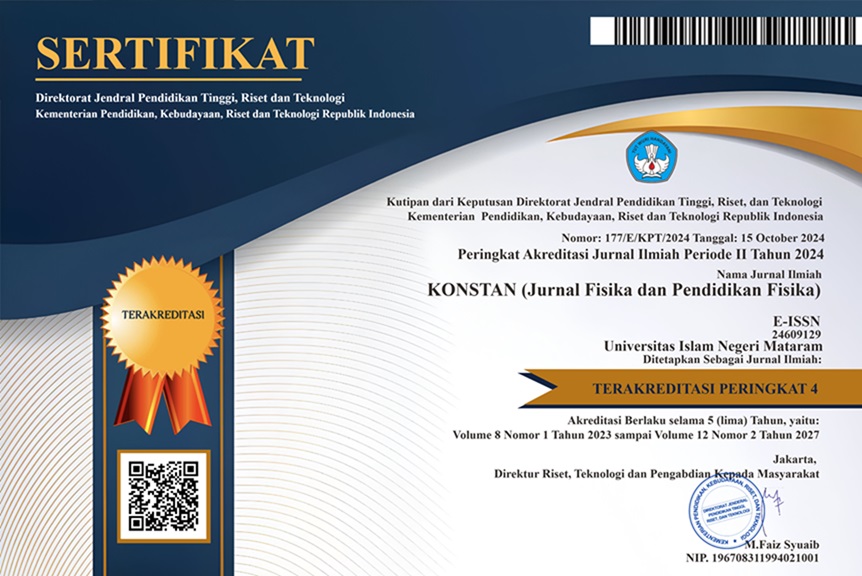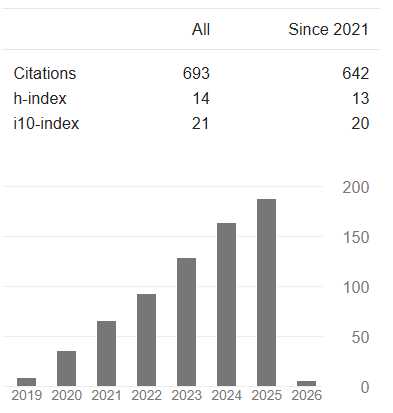Education on Pandemic Condition: The Utilization of SPADA UNRAM and Natural Laboratory in Science Learning
Abstract
Education is one of the most affected areas by the Covid-19 pandemic, especially learning. This learning is new in the PGSD Study Program at FKIP Mataram University, so monitoring and evaluation are needed. This research aims to describe the process and students' learning outcomes through the implementation of SPADA Unram and the Natural Laboratory. The research sample comprised 63 students who took Basic Natural Sciences or Ilmu Alamiah Dasar (IAD) courses—data collected for eight weeks in October–December. Data about activity and student learning outcomes include (1) the activeness in discussion forums, (2) the discipline in collecting assignments, (3) the skills in completing assignments, and (4) the ability to complete quizzes. Descriptive statistics analyzed data to determine the mean and proportion. Only a tiny proportion (<50%) of students participated in discussion forums. From the disciplinary aspect, the balance of disciplined students is the largest, but many are still not disciplined in uploading assignments at SPADA Unram. Students' skills in completing tasks are excellent, but their ability to complete quizzes is in the fair category. Indicates that improvements are needed to maintain and improve the quality of science learning processes and outcomes during the pandemic.
Downloads
References
Gunawan, G., Jufri, A. W., Nisrina, N., Al-Idrus, A., & Suranti, N. M. Y. (2020). Scientific Literacy improvement with Blended Learning Tools in Rotational Flipped Classroom for Junior High School. Solid State Technology, 63(4).
Harahap, F., Nasution, N. E. A., & Manurung, B. (2019). The Effect of blended kearning on student’s learning achievement and science process skills in Plant Tissue Culture Course. International Journal of Instruction, 12(1), 521–538.
Hidayati, D., & Saputra, W. A. (2020). Implementation of online learning during the Covid-19 epidemic in Indonesia: Assessment of higher education students’ use and implementation of online learning technology. Universal Journal of Educational Research, 8(10), 4514–4519. https://doi.org/10.13189/ujer.2020.081019
Hutauruk, A., & Sidabutar, R. (2020). Kendala pembelajaran daring selama masa pandemi di kalangan mahasiswa pendidikan matematika: Kajian kualiatatif deskriptif. SEPREN: Journal of Mathematics Education and Applied, 02(01), 45–51.
Ibrahim, M. M., & Nat, M. (2019). Blended learning motivation model for instructors in higher education institutions. International Journal of Educational Technology in Higher Education, 16, 1–21. https://doi.org/10.1186/s41239-019-0145-2
Ilyashenko, L. K., Gladkova, M. N., Kutepov, M. M., Vaganova, O. I., & Smirnova, Z. V. (2019). Development of communicative competencies of students in the context of blended learning. Amazonia Investiga, 8(18), 313–322. http://www.udla.edu.co/revistas/index.php/amazonia-investiga
Indrawati, B. (2020). Tantangan dan peluang Pendidikan Tinggi dalam masa pandemi Covid-19. Jurnal Kajian Ilmiah, 1(1), 39–48.
Law, K. M. Y., Geng, S., & Li, T. (2019). Student enrollment, motivation and learning performance in a blended learning environment: The mediating effects of social, teaching, and cognitive presence. Computers & Education, 136, 1–12. https://doi.org/10.1016/j.compedu.2019.02.021
Medina, L. C. (2018). Blended learning: Deficits and prospects in higher education. Australasian Journal of Educational Technology, 34(1), 42–56.
Mirawati, I., Mahameruaji, J. N., & Trulline, P. (2020). Indonesian student’s perception of online learning activities in the time of pandemic. European Journal of Molecular and Clinical Medicine, 7(1), 3645–3652.
Prayitno, B. A., Corebima, D., Susilo, H., Zubaidah, S., & Ramli, M. (2015). Closing the science process skills GAP between students with high and low level academic achievement. Journal of Baltic Science Education, 16(2), 266–277.
Rahmatih, A. N., & Fauzi, A. (2020). Persepsi mahasiswa calon guru sekolah dasar dalam menanggapi perkuliahan secara daring selama masa Covid-19. MODELING: Jurnal Program Studi PGMI, 7(2), 143–153.
Sabtu, Rukun, K., Sukardi, Permatasari, R. D. P., & Hayadi, B. H. (2019). Development of digital information management learning media based on Adobe Flash in Grade X of digital simulation subject. Journal of Physics: Conference Series, 1363(1), 1–6. https://doi.org/10.1088/1742-6596/1363/1/012066
Syazali, M., Rahmatih, A. N., & Nursaptini, N. (2021). Profil keterampilan proses sains mahasiswa melalui implementasi SPADA Unram. Jurnal Pijar MIPA, 16(1), 103–112. https://doi.org/10.29303/jpm.v16i1.2290
Tim Penyusun. (2019). Pedoman Akademik Universitas Mataram. Mataram: Mataram University Press.
Widodo, A., Nursaptini, N., Novitasari, S., Sutisna, D., & Umar, U. (2020). From face-to-face learning to web base learning: How are student readiness? Premiere Educandum: Jurnal Pendidikan Dasar Dan Pembelajaran, 10(2), 149–160. https://doi.org/10.25273/pe.v10i2.6801





